- Home
-
Study with us
Study with us
We make sure that every student has a hands-on education that’s filled with adventure.
Learn more- Study with us overview
- Applying to university
- Pathways to university
- Undergraduate courses
- Postgraduate courses
- Research degrees
- Online courses
- Short courses
- Where study meets sustainability
- Our accommodation
- Scholarships, fees and costs
- Starting at the University
- Learning abroad
- International students
-
Uni life
Uni life
There’s more to uni than studying. Learn how you can connect with new people through events, sports, volunteering opportunities, and more.
Learn more -
Our research
Our research
We are proud of our research excellence, which delivers impact for and from Tasmania.
Learn more -
For community & partners
For community & partners
We pride ourselves on forming deep connections, collaborating not just with one another, but with local industry, schools, and everyone who calls our island home.
Learn more -
About us
About us
Tasmania is an island of creative and curious minds. No matter where you join us from, you’ll become part of a welcoming and collaborative community.
Learn more
I'm interested in
Are you an international student?
We want to provide content that's relevant to you. Your options are stored in a browser cookie which you can delete at any time via the link below.
Choose a login
Search
- Refined by:
- Date: Past year
101 -
150 of
2,858
search results for "Tasmanian Institute of Agriculture"
Fully-matching results
-
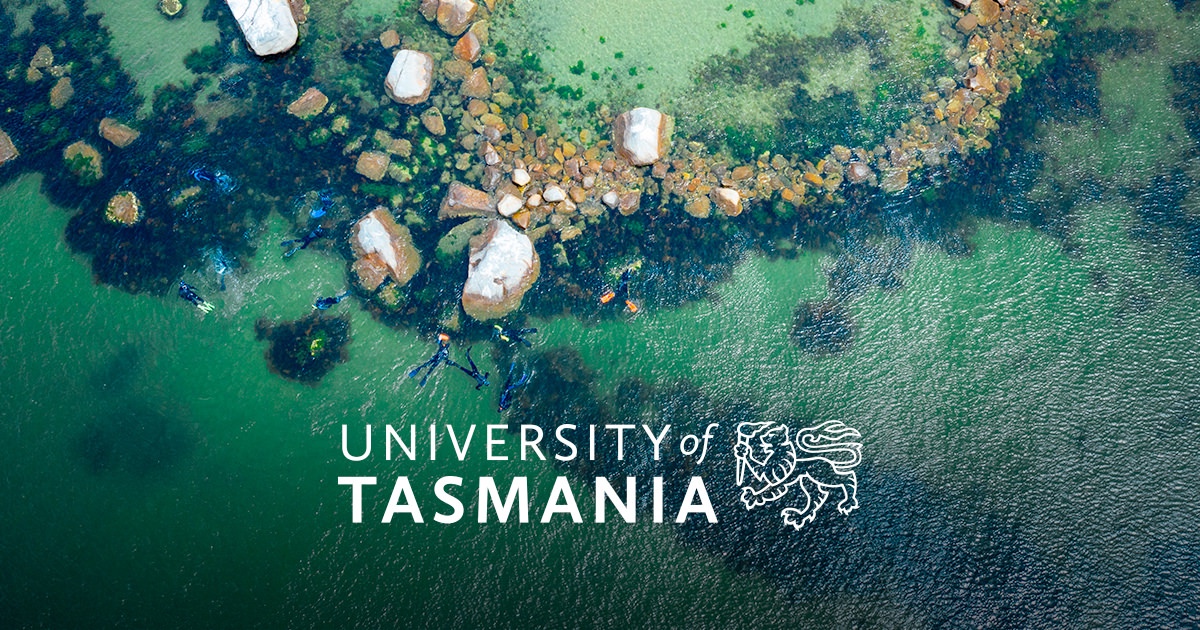
Contact us about news and stories
https://www.utas.edu.au/about/news-and-stories/contact20 Mar 2024: Cassie Harrex. Email: cassie. harrex@utas. edu. au. Phone: 61 460 705 455. Institute for Marine and Antarctic Studies. . . . Location: Medical Science Precinct, Hobart CBD. Tasmanian Institute of Agriculture. Communications Manager. -
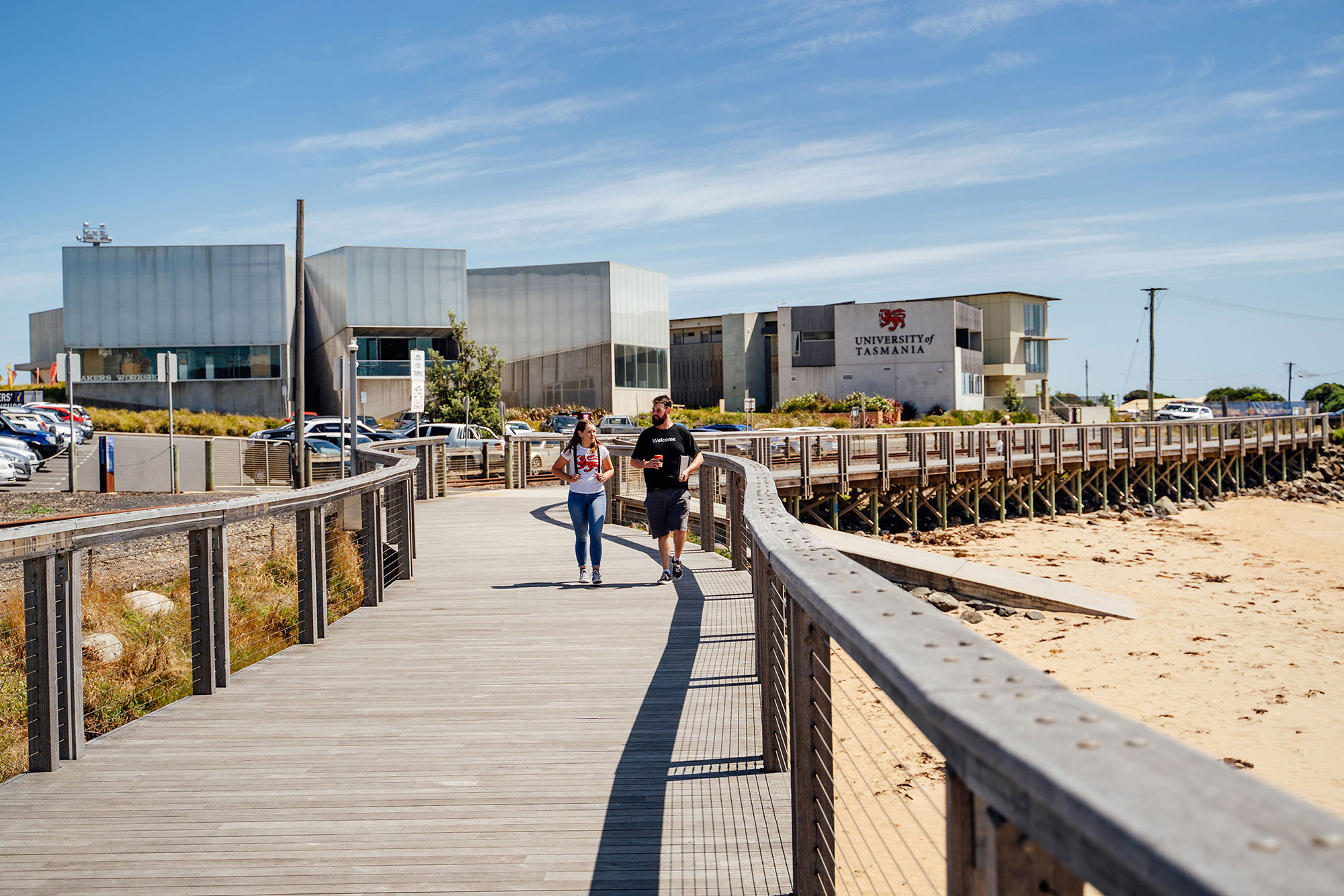
Cradle Coast campuses
https://www.utas.edu.au/about/campuses/cradle-coast27 Feb 2024: The Tasmanian Institute of Agriculture (TIA) which will be undertaking laboratory science and developing agricultural technology on-site addressing regional food production and processing challenges. . . . You’ll find our Tasmanian Institute of -
HobartThis course covers the basic mechanisms of crop function, from the molecular to the whole plant level. The broad range of fundamental processes such as photosynthesis, respiration, plant water relations, stomata physiology, mineral nutrition, plant hormone functions, plant movements, seed germination and dormancy, photomorphogenesis, photoperiodism, circadian rhythms, and environmental stress...
-
Hobart, LauncestonThis course covers the basic mechanisms of crop function, from the molecular to the whole plant level. The broad range of fundamental processes such as photosynthesis, respiration, plant water relations, stomata physiology, mineral nutrition, plant hormone functions, plant movements, seed germination and dormancy, photomorphogenesis, photoperiodism, circadian rhythms, and environmental stress...
-
This course provides Master of Applied Science students with advance knowledge of mechanisms of plant function, from the molecular to the whole plant level. The broad range of fundamental processes such as photosynthesis, respiration, plant water relations, stomata physiology, mineral nutrition, plant hormone functions, plant movements, seed germination and dormancy, photomorphogenesis,...
-
HobartThis course provides students with advance knowledge of mechanisms of plant function, from the molecular to the whole plant level. The broad range of fundamental processes such as photosynthesis, respiration, plant water relations, stomata physiology, mineral nutrition, plant hormone functions, plant movements, seed germination and dormancy, photomorphogenesis, photoperiodism, circadian rhythms,...
-
HobartThis course provides students with advance knowledge of mechanisms of plant function, from the molecular to the whole plant level. The broad range of fundamental processes such as photosynthesis, respiration, plant water relations, stomata physiology, mineral nutrition, plant hormone functions, plant movements, seed germination and dormancy, photomorphogenesis, photoperiodism, circadian rhythms,...
-
Hobart, LauncestonThe unit provides students with an overview of intensive and extensive crop production and management. Study includes agro-ecological aspects of fruit, vegetable and grain crop production in Australia and the growth and development of the major crop species. Principles underlying canopy and nutrient management, flowering and fruit development, yield formation and crop regulation are examined. ...
-
Hobart, LauncestonThe unit provides students with an overview of intensive and extensive crop production and management. Study includes agro-ecological aspects of fruit, vegetable and grain crop production in Australia and the growth and development of the major crop species. Principles underlying canopy and nutrient management, flowering and fruit development, yield formation and crop regulation are examined. ...
-
The unit provides students with an overview of intensive and extensive crop production and management. Study includes agro-ecological aspects of fruit, vegetable and grain crop production in Australia and the growth and development of the major crop species. Principles underlying canopy and nutrient management, flowering and fruit development, yield formation and crop regulation are examined....
-
HobartIn this unit we study the principles behind the management of agricultural pest insects, weeds and diseases. The unit includes modules on (1) Biosecurity, (2) Weeds, (3) Pest & disease monitoring and decision making, (4) Chemicals in crop protection,(5) Cultural control and host plant resistance, (6) Biological control, and (7) Integrated pest and disease management. This unit, and related units...
-
HobartIn this unit we study the principles behind the management of agricultural pest insects, weeds and diseases. The unit includes modules on (1) Biosecurity, (2) Weeds, (3) Pest & disease monitoring and decision making, (4) Chemicals in crop protection,(5) Cultural control and host plant resistance, (6) Biological control, and (7) Integrated pest and disease management. This unit, and related units...
-
HobartIn this unit we study the principles behind the management of agricultural pest insects, weeds and diseases. The unit includes modules on (1) Biosecurity, (2) Weeds (3) Pest & disease monitoring and decision making; (4) Chemicals in crop protection; (5) Cultural control and host plant resistance; (6) Biological control; and (7) Integrated pest and disease management. This unit, and related units...
-
HobartIn this unit we study the principles behind the management of agricultural pest insects, weeds and diseases. The unit includes modules on (1) Biosecurity, (2) Weeds (3) Pest & disease monitoring and decision making; (4) Chemicals in crop protection; (5) Cultural control and host plant resistance; (6) Biological control; and (7) Integrated pest and disease management. This unit, and related units...
-
This unit is the mandatory first unit of the course, it is the foundational unit by setting up the student up for the remainder of the units in the course. It introduces the student to strategic management and shows the student how each unit fits into the course structure, and therefore, the final unit artifact, the Strategic Plan. The output of this unit is as follows:1. Introduction to the...
-
OnlineThis unit is the mandatory first unit of the course, it is the foundational unit by setting up the student up for the remainder of the units in the course. It introduces the student to strategic management and shows the student how each unit fits into the course structure, and therefore, the final unit artifact, the Strategic Plan. The output of this unit is as follows: 1. Introduction to the...
-
Dairy Farm Monitor Project Tasmania | Annual report 2017–18 ...
https://www.utas.edu.au/__data/assets/pdf_file/0011/1663859/DFMP-TAS-Annual-Report-2017-18-DIGITAL-FINAL.pdf3 Jul 2023: The project was made possible this year through the guidance and contributions of Lesley Irvine from the Tasmanian Institute of Agriculture and Helen Quinn from Dairy Australia. . . . Lesley IrvineTasmanian Institute of AgriculturePO Box 3523Burnie, -
This unit introduces the different types of dairy farming systems and the internal and external alignment of these with production-oriented business practices and value creation. Farming systems are both complex and dynamic and a holistic management approach requires an understanding of the system within the context of societal expectations regarding animal welfare, natural resource management,...
-
OnlineThis unit introduces the different types of dairy farming systems and the internal and external alignment of these with production-oriented business practices and value creation. Farming systems are both complex and dynamic and a holistic management approach requires an understanding of the system within the context of societal expectations regarding animal welfare, natural resource management,...
-
Dairy High Farmlet Report 1 - August 2023
https://www.utas.edu.au/__data/assets/pdf_file/0007/1677715/Farmlet-Report-1-August-2023.pdf3 Oct 2023: 21. 8 21. 2 21. 2Nitrogen use. While the Tasmanian Institute of Agriculture (TIA) takes reasonable steps to ensure the information in its publications is correct, it provides no warranty or . . . Comments Farmlet 1. 20 cows (about 70% of target number) -
OnlineIn this unit, students gain an understanding of the differences between supply and value chain concepts, and the role of a student’s dairy business in a dairy supply and value chain. Students will learn about the key drivers of the supply and value chain, including production, inventory, location, transportation, and information, and how they can optimise these to a student’s business’...
-
OnlineIn this unit, students gain an understanding of the differences between supply and value chain concepts, and the role of a student’s dairy business in a dairy supply and value chain. Students will learn about the key drivers of the supply and value chain, including production, inventory, location, transportation, and information, and how they can optimise these to a student’s business’...
-
With the rise of more varied and specialised diets, consumers are seeking novel and nutritious value-added food products. This unit examines how new food products are created and developed, and explores the role of science in determining the optimal properties and safety of new foods. These elements will be illustrated through case studies based on topical situations addressing marketing,...
-
With the rise of more varied and specialised diets, consumers are seeking novel and nutritious value-added food products. This unit examines how new food products are created and developed, and explores the role of science in determining the optimal properties and safety of new foods. These elements will be illustrated through case studies based on topical situations addressing marketing,...
-

Diverse career opportunities for Agricultural Science graduates
https://www.utas.edu.au/about/news-and-stories/articles/2023/agricultural-science-alumni28 Mar 2023: on farms, at board tables, in classrooms, in laboratories, or advising governments. The Bachelor of Agricultural Science with Honours is taught by the Tasmanian Institute of Agriculture (TIA). “Young people have . . . Our students have an opportunity to -

Donna Lucas | Agricultural Science Alumni 2007
https://www.utas.edu.au/about/news-and-stories/articles/2023/donna-lucas-agriculture-science-alumni-200728 Nov 2023: We caught-up with some of our alumni to hear their reflections of studying agriculture science and find out where their careers have taken them. . . . we celebrate 60 years of Agriculture Science at the University of Tasmania. -

Dual purpose peonies: do Tasmanian grown peonies have potential as a…
https://www.utas.edu.au/about/news-and-stories/articles/2023/dual-purpose-peonies-do-tasmanian-grown-peonies-have-potential-as-a-traditional-chinese-herb6 Dec 2023: Trials are underway in the state’s north to determine whether Tasmania could produce peony roots for the Traditional Chinese Medicine market (TCM). PhD Candidate with the Tasmanian Institute of Agriculture . . . Director of TIA Professor Michael Rose said -
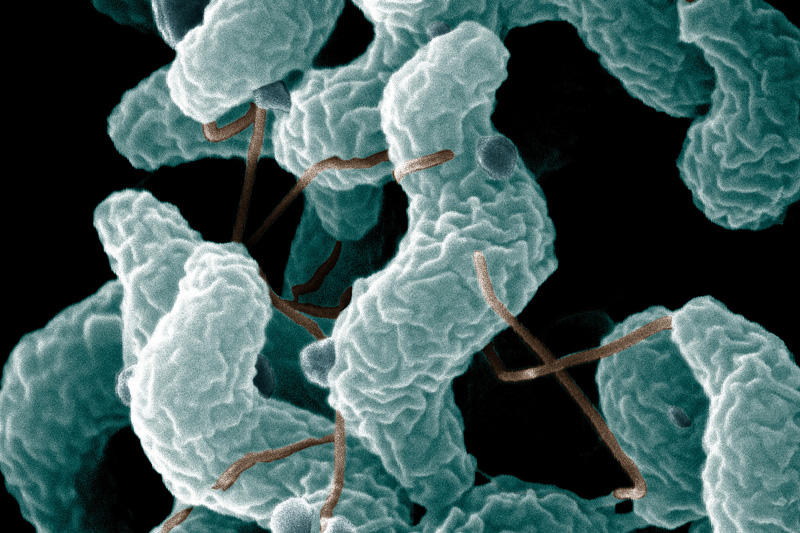
Ensuring safety of chicken meat | Tasmanian Institute of Agriculture
https://www.utas.edu.au/tia/research/research-projects/project/food-safety-and-innovation/ensuring-safety-of-chicken-meat1 Aug 2023: This project involves the purchase of chicken meat samples at retail in Tasmania and examination for levels of Campylobacter bacteria (focussing on C. . . . Acknowledgements:. This project was funded by the Department of Health and Human Services Tasmania. -
This unit introduces you to the disciplines of entomology and plant pathology. It explores the classification, diversity, structure, function and general biology of insects and examines the concepts of plant disease and diagnostic procedures for plant pathogens (including viruses, bacteria, fungi, and nematodes). A collection of insects is a required component of the unit....
-

Evaluation and predictive modelling of shelf life of frozen beef…
https://www.utas.edu.au/tia/research/research-projects/project/food-safety-and-innovation/evaluation-and-predictive-modelling-of-shelf-life-of-frozen-beef-products-in-different-packaging-systems1 Aug 2023: A long-term study at the Tasmanian Institute of Agriculture (TIA) and University of Tasmania, funded by Meat & Livestock Australia (MLA) developed mathematical models to predict the effect of storage temperature . . . Acknowledgements:. This research was -
HobartThis unit enables students to plan and complete scientific investigations essential to agricultural research. The unit follows a logical progression from understanding the importance of the principles of the scientific method and crafting a well-defined research hypothesis that can be tested using well-designed experiments relevant to agricultural settings and then making sound judgement in the...
-
Extending the shelf life of ready-to-eat salad…
https://www.utas.edu.au/__data/assets/pdf_file/0009/1656180/Fact-sheet-Baby-leaf-salad-Vongai-Dakwa_web.pdf10 May 2023: Improving the quality & shelf life of fresh-cut fruit. • Re-assessing organic standards. • . . . 40 calories per cup. DISCLAIMER. While the Tasmanian Institute of Agriculture (TIA) takes reasonable steps to ensure that the information on its fact -
Hobart, LauncestonIn this unit, students will develop an understanding of farming as a business. The unit will cover the application of economic principles to support management decisions of a farm business, specifically focusing on how land, labour and capital are used to attain the goals and aspirations of owners. Using case studies of farm businesses, students will use economic and financial techniques to...
-
Hobart, LauncestonIn this unit, students will develop an understanding of farming as a business. The unit will cover the application of economic principles to support management decisions of a farm business, specifically focusing on how land, labour and capital are used to attain the goals and aspirations of owners. Using case studies of farm businesses, students will use economic and financial techniques to...
-
Hobart, OnlineIn this interdisciplinary unit, students will be introduced to systems thinking and practice in a farming context. Systems approaches will be used to explore how broader social, cultural, political, economic and ecological factors influence farming. Using local and international case studies, students will apply different systems approaches to analyse complex problems in agriculture and explore...
-
Hobart, LauncestonIn this interdisciplinary unit, students explore systems approaches to farming, wherein understanding of various components of a farm is linked to broader social, cultural, political, institutional, economic and ecological factors that influence how a farm operates. The first partof the unit introduces students to systems thinking and systems practice in a farming context. Using local and...
-
Hobart, OnlineIn this interdisciplinary unit, students will be introduced to systems thinking and practice in a farming context. Systems approaches will be used to explore how broader social, cultural, political, economic and ecological factors influence farming. Using local and international case studies, students will apply different systems approaches to analyse complex problems in agriculture and explore...
-
HobartIn this interdisciplinary unit, students will be introduced to systems thinking and practice in a farming context. Systems approaches will be used to explore how the broader social, cultural, political, institutional, economic and ecological factors influence how a farm operates. Different farming styles and approaches will be discussed. Using local and international case studies, students will...
-
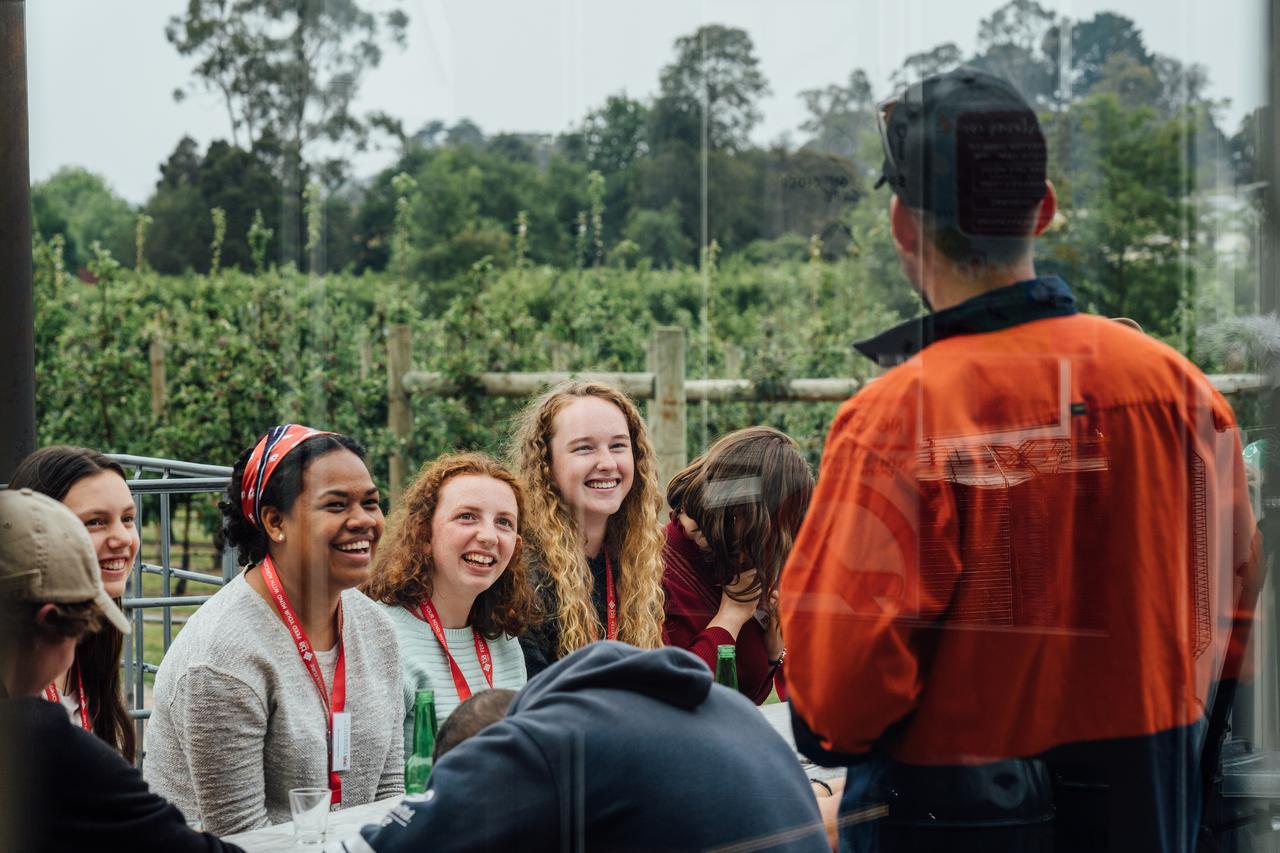
Feed Your Mind, Feed The World
https://www.utas.edu.au/community-and-partners/schools/activities/sciences/feed-your-mind-feed-the-world9 Jan 2024: The camp is hosted by the Tasmanian Institute of Agriculture (TIA), who are the agricultural research arm of the University of Tasmania, and are responsible for teaching the Bachelors degree. . . . Transport. For Tasmanian students, transport to/from Hobart -
OnlineTasmania has a growing reputation as a gourmet paradise, with high quality primary products and a growing fermented food and drink industry. In this unit, students will learn about the full production life cycle for fermented food and drink, from raw materials and fermentation basics, through to the packaging, labelling, distribution and marketing of final products. Development of more...
-
OnlineTasmania has a growing reputation as a gourmet paradise, with high quality primary products and a growing fermented food and drink industry. In this unit, students will learn about the full production life cycle for fermented food and drink, from growing raw materials and fermentation basics, through to the packaging, labelling, distribution, and marketing of final products. Development of more...
-
OnlineTasmania has a growing reputation as a gourmet paradise, with high quality primary products and a growing fermented food and drink industry. In this unit, students will learn about the full production life cycle for fermented food and drink, from raw materials and fermentation basics, through to the packaging, labelling, distribution and marketing of final products. Development of more...
-
OnlineTasmania has a growing reputation as a gourmet paradise, with high quality primary products and a growing fermented food and drink industry. In this unit, students will learn about the full production life cycle for fermented food and drink, from growing raw materials and fermentation basics, through to the packaging, labelling, distribution and marketing of final products. Development of more...
-
Hobart, LauncestonApproximately two thirds of Australia's agricultural commodities are exported each year, generating $50 billion. This unit provides an understanding of historical developments, current status and future opportunities and challenges of the dominant agricultural and horticultural industries in Tasmania and Australia. Key factors involved in establishing new industries and the importance of...
-
Hobart, Launceston, OnlineApproximately two thirds of Australia's agricultural commodities are exported each year, generating $50 billion. This unit provides an understanding of historical developments, current status and future opportunities and challenges of the dominant agricultural and horticultural industries in Tasmania and Australia. Key factors involved in establishing new industries and the importance of...
-
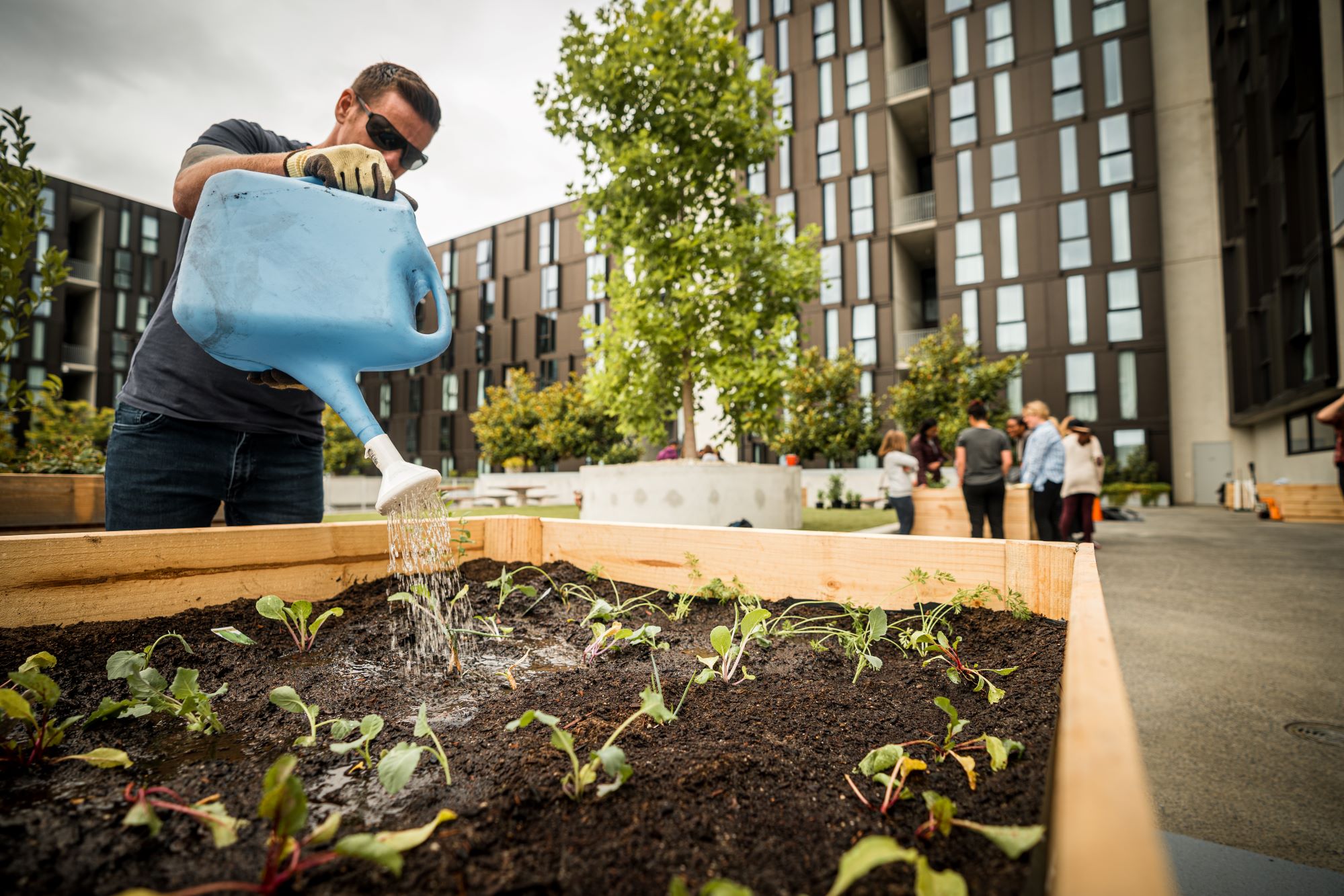
Food and gardens | Sustainability
https://www.utas.edu.au/about/sustainability/facilities-and-operations/food-and-gardens13 Dec 2023: As these mature, and following the cultural practices of Tasmanian Aboriginals, the flowers will be harvested and the nectar used to make a sweet drink. . . . Cradle Coast Campus. There is a small vegetable garden (1 X 2m), originally set up by the -
HobartDuring processing, storage, and utilization of food, changes occur in the chemistry of major components, in properties and interactions among components. These changes can affect food quality, food safety, as well as the access of food into global markets. Food can also become contaminated with chemicals, from farm to the consumer. Examples of food contaminants include pesticides, veterinary drugs...
-
LauncestonThis unit will introduce students to the chemistry, biochemistry and toxicology of foods. This includes an understanding of the chemical function and properties of food components, chemical interactions in foods, their effects on nutritional quality and functional properties, and potential chemical contaminants in food that could cause foodborne illness. Food constituents are described in terms...
-
Hobart, LauncestonThis unit considers the role of microorganisms in the production, deterioration and safety of foods, from both ecological and physiological perspectives, including the effect of temperature, pH, water activity and other factors on the growth and decline of microbial populations in foods. Specific topics include: - microbial physiology and ecology relevant to foods - microbial spoilage processes...
-
HobartThis unit considers the role of microorganisms in the production, deterioration and safety of foods, from both ecological and physiological perspectives, including the effect of temperature, pH, water activity and other factors on the growth and decline of microbial populations in foods. Specific topics include: - microbial physiology and ecology relevant to foods - microbial spoilage processes...
Back to results
Shortlist
Clear
all
Back to results
History
Recently clicked results
Clear
all
Recent searches
Clear
all
The University of Tasmania uses cookies to deliver content that’s relevant to you. We rely on cookies to remember your preferences, provide personalised content, and to analyse our website traffic. You consent to our cookies if you click “Accept”. Please refer to our privacy policy for more information.
- Essential functionality (required) - these cookies are needed for this website to run and are always turned on.
- Personalisation and preferences - these cookies help us remember your preferences and deliver a more personalised experience.
- Personalisation and analytics - these cookies help us gather non-identifiable data about the way our site is used and to help us make improvements.
- Marketing and promotion